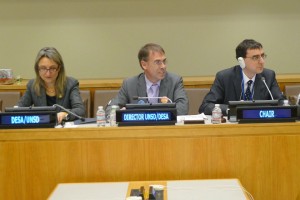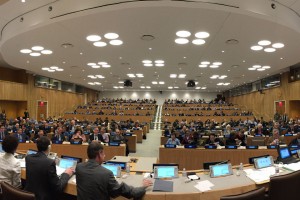
Chairing meetings is an occupational hazard for all Civil Service leaders, but recently I was tested like never before on my skills in that department.
I arrived in New York on a bitterly cold weekend in early March to be briefed by the executive team at the United Nations on the role of chairing the 46th session of the UN Statistical Commission.
The commission consists of 24 countries elected on a regional basis. It exists as the highest global standards setting and methodological body for measurement of economic, social and environmental matters. This year, as well as commission members, it was expected to attract representatives from large numbers of countries, international agencies and non-governmental organisations, given the political significance of several items on the agenda.
And so it proved. On the first morning, the representative of the United States nominated me to serve as chair, with the support of other commission members, and I left the familiar comfort of sitting behind the United Kingdom flag to step up to the podium in front of well over 500 delegates.
After a brief acceptance speech from me, and a stirring call to action from the UN Deputy Secretary-General, we got down to work. Our first item was the one that had brought so many people to a snowbound New York: how to chart progress across the world on sustainable development for all peoples. This is a big political priority for the UK but also for other countries in every region of the world, not all of which have the same views.
Spectacular gavel

The French delegate started us off and immediately the screen in front of me started whirring with people wishing to speak. Suddenly, the challenge was real. How would I get us through the meeting without diplomatic incident and with a useful way forward? The secretariat at the UN is brilliant and helped me out with all the techniques available, including a rather spectacular gavel that can make the whole room jump when wielded with enough energy. Fifty-two contributions later we were able to sum up the debate with quite a clear conclusion that will next go to the UN General Assembly.
I felt like it should be the end of the day, but this was just the first part of the first item. We carried on with a discussion on how to mobilise the power of the data revolution to transform our ability to help governments and citizens alike make better decisions. Some great examples from many countries, especially in Latin America, encouraged us to establish a much stronger basis for a learning system built on knowledge-sharing, so we can harness big data and related opportunities.
From that, we went on to agree a plan to lift the art of census-taking to a new level, so that every person across the world can be counted and their circumstances taken into account when making decisions. The stories from countries unable to conduct a census in recent times due to war or disaster illustrated just how critical the census is in our global information infrastructure and in the sense of identity of individuals.
So, on we went, through common measurement of crime (we are not the only country that has issues with consistent recording of crimes by the police), how to measure refugees and internally displaced people (again some massive challenges in some countries), standards for measuring the economy and trade in a globalised world, accounting for environmental change, prices, agriculture and health, among others.
British humour
Finally, we came to the most challenging issue of all, but one where there is a powerful political desire for a global data framework - statistics on governance, peace and security. The whole meeting was televised, but on this item we had to get the timing right since in some countries we had been told people were glued to their TV screens to hear our deliberations. Large numbers of countries intervened to support the initiative being taken, while recognising the technical challenges.
I think that everyone went away at the end feeling their voice had been heard and that we had done a good job. The detailed report, agreed line by line before the final session concluded, set out practical steps to improve the way in which we harness data to improve our understanding of the world and help make better decisions in keeping with the theme for the meeting: better data - better lives
Many delegates told me that the strongest characteristic of the British is humour. I certainly found it helped me to defuse tension in the meeting far more effectively than the gavel. Maybe the next big idea for Civil Service training should be comedy - after all, in our personal development we should always play to our strengths.
